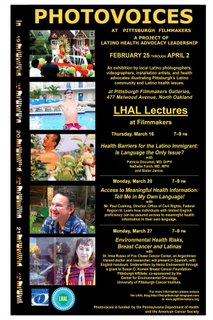Dr Diego Chavez-Gnecco recipient of prestigious Award
Dr. Diego Chaves-Gnecco will receive this year's "Margaret Gloninger" Award, given by the University of Pittsburgh's Graduate School of public Health to an alumnuns who has performed significant service to the commuity. (See below).
Diego is a pedaitrician, origianlly from Colombia, who is dedicated to our community. He offers once a month a free pediatric clinic in psanish, once a week a clinic at Children's for Spanish -speaking children, and organizes the Car Seat Check among other things. Diego participates in LACU, the leadership of the Latino CAtholic Community, the organizing committee for the annual fair "Al Servicio de la Comunidad" and the Latino Round Table. He finished his Master's of Public Health in 2000.
CONGRATUALTIONS DIEGO!
Patricia Documet
The Margaret F. Gloninger Award was established in honor of the late Margaret Fitzgerald Gloninger (MSHyg '66), GSPH graduate and former faculty member in maternal and child health. This award is presented annually to a GSPH alumnus who has made a significant contribution to GSPH or to the community through volunteer service.
Read more...


